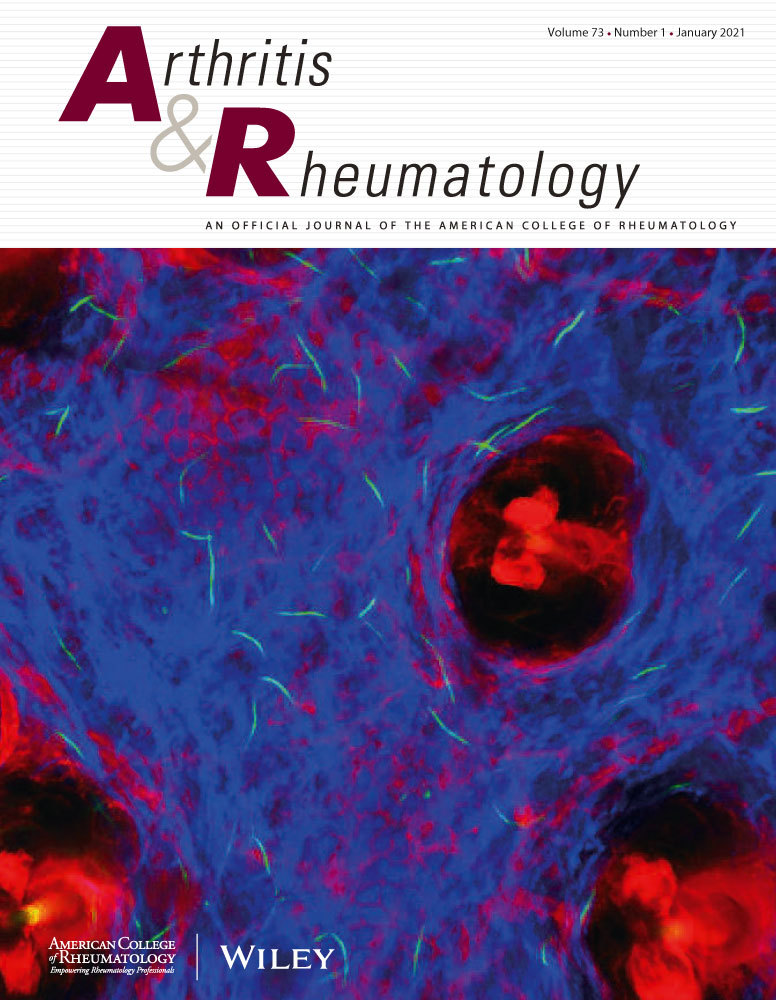Mucosal-associated invariant T cells in rheumatic diseases.
IF 10.9
1区 医学
Q1 RHEUMATOLOGY
引用次数: 0
Abstract
Mucosal-associated invariant T (MAIT) cells are innate-like T cells defined by their semi-invariant T cell receptor (TCR) and restriction by the MHC class I-related molecule (MR1). These cells are primarily activated by microbial-derived metabolites presented by MR1 or by cytokines. Upon activation, MAIT cells rapidly produce pro-inflammatory cytokines, including IFN-γ, TNF-α, and IL-17, and secrete cytotoxic molecules such as granzyme B. Due to their ability to interact with microbiota and accumulate in inflamed tissues, MAIT cells have attracted great interest in autoimmune and inflammatory diseases. In this review, we summarize recent findings on MAIT cells in major rheumatic diseases, including rheumatoid arthritis, spondyloarthritis, psoriatic arthritis, systemic lupus erythematosus, systemic sclerosis, primary Sjögren syndrome, and dermatomyositis. Circulating MAIT cells frequency is reduced in these diseases. Interestingly, the residual MAIT cells exhibit an activated profile and increased cytokine-producing capacity in some conditions. Moreover, an enrichment of MAIT cells in inflamed tissues is described in rheumatoid arthritis, spondyloarthritis, psoriatic arthritis, and primary Sjögren syndrome. This pattern suggests that MAIT cells may migrate from the circulation to inflamed tissues, contributing to local immune responses. Furthermore, they have been shown to play a critical role in disease progression in two mouse models. All these findings suggest an involvement of MAIT cells in inflammatory rheumatologic diseases and their potential therapeutic target.风湿病中粘膜相关的不变性T细胞。
mucal -associated invariant T (MAIT)细胞是先天样T细胞,由其半不变T细胞受体(TCR)和MHC i类相关分子(MR1)限制所定义。这些细胞主要被MR1呈递的微生物衍生代谢物或细胞因子激活。激活后,MAIT细胞迅速产生促炎细胞因子,包括IFN-γ、TNF-α和IL-17,并分泌细胞毒性分子,如颗粒酶b。由于它们能够与微生物群相互作用并在炎症组织中积累,MAIT细胞在自身免疫性和炎症性疾病中引起了极大的兴趣。在这篇综述中,我们总结了MAIT细胞在主要风湿性疾病中的最新发现,包括类风湿关节炎、脊椎关节炎、银屑病关节炎、系统性红斑狼疮、系统性硬化症、原发性Sjögren综合征和皮肌炎。在这些疾病中,循环MAIT细胞的频率降低。有趣的是,在某些条件下,残留的MAIT细胞表现出激活的特征和增加的细胞因子生产能力。此外,炎症组织中MAIT细胞的富集在类风湿关节炎、脊椎关节炎、银屑病关节炎和原发性Sjögren综合征中被描述。这种模式表明MAIT细胞可能从循环系统迁移到发炎组织,促进局部免疫反应。此外,在两种小鼠模型中,它们已被证明在疾病进展中起关键作用。所有这些发现提示MAIT细胞参与炎症性风湿病及其潜在的治疗靶点。
本文章由计算机程序翻译,如有差异,请以英文原文为准。
求助全文
约1分钟内获得全文
求助全文
来源期刊

Arthritis & Rheumatology
RHEUMATOLOGY-
CiteScore
20.90
自引率
3.00%
发文量
371
期刊介绍:
Arthritis & Rheumatology is the official journal of the American College of Rheumatology and focuses on the natural history, pathophysiology, treatment, and outcome of rheumatic diseases. It is a peer-reviewed publication that aims to provide the highest quality basic and clinical research in this field. The journal covers a wide range of investigative areas and also includes review articles, editorials, and educational material for researchers and clinicians. Being recognized as a leading research journal in rheumatology, Arthritis & Rheumatology serves the global community of rheumatology investigators and clinicians.
 求助内容:
求助内容: 应助结果提醒方式:
应助结果提醒方式:


